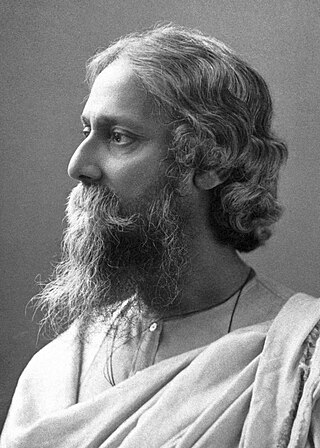
Error: no inner hatnotes detected (help).

Taslima Nasrin is a Bangladeshi writer, physician, feminist, secular humanist, and activist. She is known for her writing on women's oppression and criticism of religion; some of her books are banned in Bangladesh. She has also been blacklisted and banished from the Bengal region, both from Bangladesh and the Indian state of West Bengal.

Islam is the largest and the state religion of the People's Republic of Bangladesh. According to the 2022 census, Bangladesh had a population of about 150 million Muslims, or 91.04% of its total population of 165 million. The majority of Bangladeshis are Sunni, and follow the Hanafi school of fiqh. Despite being a Muslim-majority country, Bangladesh is a de facto secular state.

Lalon, also known as Lalon Shah, Lalon Fakir, Shahji and titled Fakir, Shah, was a prominent Bengali spiritual leader, philosopher, mystic poet and social reformer born in British India. Regarded as an icon of Bengali culture, he inspired and influenced many philosophers, poets and social thinkers including Rabindranath Tagore, Kazi Nazrul Islam and Allen Ginsberg. Lalon's philosophy of humanity rejects all distinctions of caste, class, and creed and takes stand against theological conflicts and racism. It denies all worldly affairs in search of the soul and embodied the socially transformative role of sub-continental Bhakti and Sufism.

Humanists International is an international non-governmental organisation championing secularism and human rights, motivated by secular humanist values. Founded in Amsterdam in 1952, it is an umbrella organisation made up of more than 160 secular humanist, atheist, rationalist, agnostic, skeptic, freethought and Ethical Culture organisations from over 80 countries.

Bengali literature denotes the body of writings in the Bengali language and which covers Old Bengali, Middle- Bengali and Modern Bengali with the changes through the passage of time and dynastic patronization or non-patronization. Bengali has developed over the course of roughly 1,300 years. If the emergence of the Bengali literature supposes to date back to roughly 650 AD, the development of Bengali literature claims to be 1600 years old. The earliest extant work in Bengali literature is the Charyapada, a collection of Buddhist mystic songs in Old Bengali dating back to the 10th and 11th centuries. The timeline of Bengali literature is divided into three periods: ancient (650–1200), medieval (1200–1800) and modern. Medieval Bengali literature consists of various poetic genres, including Hindu religious scriptures, Islamic epics, Vaishnava texts, translations of Arabic, Persian and Sanskrit texts, and secular texts by Muslim poets. Novels were introduced in the mid-19th century. Nobel laureate Rabindranath Tagore is the best known figure of Bengali literature to the world. Kazi Nazrul Islam, notable for his activism and anti-British literature, was described as the Rebel Poet and is now recognised as the National poet of Bangladesh.
The United Nations categorizes Bangladesh as a moderate democratic Muslim country. Sunni Islam is the largest and most dominant religion practiced in the country. In the Constitution of Bangladesh, Islam is referred to twice in the introduction and Part I of the constitution. The document begins with the Islamic phrase Bismillahir Rahmanir Raheem which in English is translated as "In the name of Allah, the Beneficent, the Merciful" and article (2A) declares that:"Islam is the state religion of the republic".
The People's Republic of Bangladesh went from being a secular state in 1971 to having Islam as the state religion in 1988. Despite its state religion, Bangladesh uses a secular penal code dating from 1860—the time of the British occupation. The penal code discourages blasphemy by a section that forbids "hurting religious sentiments." Other laws permit the government to confiscate and to ban the publication of blasphemous material. Government officials, police, soldiers, and security forces may have discouraged blasphemy by extrajudicial actions including torture. Schools run by the government have Religious Studies in the curriculum.

On 4 April 2013 all Bengali blogs were blacked out for an indefinite time to protest the arrest of four bloggers in Bangladesh. The blackout was to back a demand for the unconditional release of the arrested bloggers. A fundamentalist group named Hefajat-e-Islam Bangladesh started a campaign to hang freethinking bloggers, and demanding tough blasphemy laws. In response, the government started monitoring Bengali blog sites and sending letters to their authorities to terminate the alleged "anti-religious" blogs and provide information about the alleged "anti-religious" bloggers. Individual bloggers showed their solidarity with this blackout by changing their profile photos on Facebook and by tweeting with the #MuzzleMeNot hashtag. Different international organizations expressed deep concern about taking free-thinking bloggers into custody. After 92 hours of blackout, blogs returned online by publishing a press release on their central Facebook page.
Ahmed Rajib Haider was a Bangladeshi atheist blogger. He used to blog in the blogging communities namely somewhereinblog.net, amarblog.com and nagorikblog.com and used the pseudonym Thaba Baba.

The Ansarullah Bangla Team(ABT)(Bengali: আনসারুল্লাহ বাংলা টিম), also known as Ansar-al Islam Bangladesh/Ansar Bangla is an radical islamic terrorist organization in Bangladesh, implicated in crimes including some brutal attacks and murders of atheist bloggers from 2013 to 2015 and a bank heist in April 2015. The gang was outlawed days after the bank robbery by the Ministry of Home Affairs on 25 May 2015. The group has been claimed by police to be linked to Islami Chhatra Shibir, the student wing of Jamaat-e-Islami party in Bangladesh.
The Worldwide Protests for Free Expression in Bangladesh were a series of rallies outside Bangladeshi embassies and consulates to demand the release of four Bangladeshi bloggers who had been arrested on charges of blasphemy. The protests took place on 25 April – 2 May 2013 and were organised by the Center for Inquiry (CFI), American Atheists, and the International Humanist and Ethical Union. Demonstrations were held in Dhaka, New York City, Washington, D.C., London, Ottawa and other cities around the world. Secularists sought to express their solidarity with those jailed for speaking their minds about religion. Protesters drew attention to those who were being persecuted for exercising free speech, seeking to convince the international community to exert influence to have the bloggers set free by the Bangladeshi government.

Kazi Anis Ahmed is a Bangladeshi writer, publisher and businessman. He is a co-founder and publisher of the English-language daily newspaper Dhaka Tribune, online news portal Bangla Tribune and the literary journal Bengal Lights. Ahmed is the author of three works of fiction. He is a co-director of the annual Bangladeshi literary festival, Dhaka Lit Fest.
Irreligion in Bangladesh is rare and uncommon publicly. A Gallup survey conducted between 2014 - 2015 found that approximately less than 1% of Bangladeshis identified as convinced atheists. Bangladesh has 157.8 million people as of 2015 estimation.

Al-Qaeda in the Indian Subcontinent usually abbreviated as AQIS, is an Islamist militant organization which aims to fight the governments of Pakistan, Afghanistan, India, Myanmar and Bangladesh in order to establish an Islamic state and seeks to establish an Islamic caliphate in Indian Subcontinent.
Avijit Roy was a Bangladeshi-American engineer, online activist, writer, and blogger known for creating and administrating the Mukto-Mona (Free-minded), an Internet blogging community for Bangladeshi freethinkers, rationalists, skeptics, atheists, and humanists. Roy was an advocate of free expression in Bangladesh, coordinating international protests against government censorship and imprisonment of atheist bloggers. He was hacked to death by machete-wielding assailants in Dhaka, Bangladesh, on 26 February 2015; Islamic militant organization Ansarullah Bangla Team claimed responsibility for the attack.

Asif Mohiuddin is a Bangladeshi atheist and secular activist, religious critic and feminist. In 2012, he won The Bobs-Best of Online Activism award from Deutsche Welle, who stated that "Asif's blog was one of the most read web pages in Bangladesh and is known for its strong criticism of Islamic fundamentalism in Bangladesh's "anti-people politics", his blog was later blocked and banned in Bangladesh by its government. On 15 January 2013, he survived an assassination attempt by Islamic extremists. A few months later, he was imprisoned twice by the Bangladesh Government for posting "offensive comments about Islam and Mohammad". Due to sustained international pressure, Mohiuddin was released, after which he fled from his country to Germany in 2014. In 2015, he received the Anna Politkovskaya Prize for Journalism, awarded by Italian magazine Internazionale.
Attacks by Fundamentalist in Bangladesh refers to a period of turbulence in Bangladesh between 2013 and 2016 where attacks on a number of secularist and atheist writers, bloggers, and publishers in Bangladesh; foreigners; homosexuals; and religious minorities such as Hindus, Buddhists, Christians and Ahmadis were seen as having attacked Islam and the Prophet Muhammad with many killed by Muslim extremists in retaliation. By 2 July 2016 a total of 48 people, including 20 foreign nationals, were killed in such attacks. These attacks were largely blamed on extremist groups such as Ansarullah Bangla Team and Islamic State of Iraq and Syria. The Bangladeshi government was criticized for its response to the attacks, which included charging and jailing some of the secularist bloggers for allegedly defaming some religious groups; or hurting the religious sentiments of different religious groups; or urging the bloggers to flee overseas. This strategy was seen by some as pandering to hard line elements within Bangladesh's Muslim majority population. About 89% of the population in Bangladesh is Sunni Muslim. The government's eventual crackdown in June 2016 was also criticized for its heavy-handedness, as more than 11,000 people were arrested in a little more than a week.

Asaduzzaman Noor, better known as Asad Noor, is an exiled Bangladeshi blogger and human rights activist. Noor is an advocate for freedom of expression and LGBT rights, who has criticised religious fundamentalism in Bangladesh. He has been prosecuted multiple times by Bangladeshi authorities for alleged blasphemy and hurting religious sentiments. He has been living in exile since 2019.












